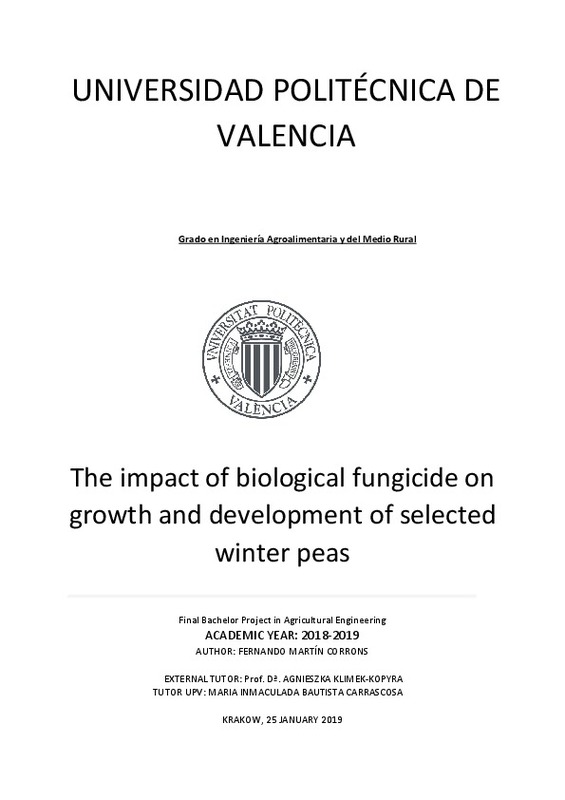JavaScript is disabled for your browser. Some features of this site may not work without it.
Buscar en RiuNet
Listar
Mi cuenta
Estadísticas
Ayuda RiuNet
Admin. UPV
The impact of biological fungicide on growth and developement of selected winter peas
Mostrar el registro sencillo del ítem
Ficheros en el ítem
| dc.contributor.advisor | Bautista Carrascosa, María Inmaculada
|
es_ES |
| dc.contributor.advisor | Klimek-Kopyra, Agnieszka
|
es_ES |
| dc.contributor.author | Martín Corrons, Fernando Pedro
|
es_ES |
| dc.date.accessioned | 2020-03-29T15:21:28Z | |
| dc.date.available | 2020-03-29T15:21:28Z | |
| dc.date.created | 2019-07-19 | |
| dc.date.issued | 2020-03-29 | es_ES |
| dc.identifier.uri | http://hdl.handle.net/10251/139734 | |
| dc.description.abstract | [ES] En este trabajo se pretende analizar el comportamiento de distintas variedades de guisante de invierno en una zona geográfica concreta. Al mismo tiempo, se quiere poner a prueba el impacto en el desarrollo de estos dos fungicidas distintos, Polyversum y Serenade. Se ha estado llevando a cabo un experimento de campo durante el período 2018/2019 en la Estación Experimental de la Universidad de Agricultura Rolniczy en Prusy, Cracovia, Polonia. El suelo se clasifica como un chernozem degradado, generado a partir de arcilla y caracterizado por un alto contenido de nutrientes disponibles (pH = 6.3, carbono orgánico = 2.2, P205 = 15.3, K2o = 26.1, Mg = 10). Se han ido aplicando las faltas de fertilización mineral. Este ha sido un experimento de campo de dos factores aplicados en bloques al azar con tres repeticiones. La parcela es de 10m2 el cultivo que precedía a este en la rotación era el trigo de invierno. El primer factor es la aplicación del fungicida (Polyversum, serenade y un sector de control), mientras que el segundo factor es el tipo variedades seleccionadas de guisantes de invierno. Las mediciones se llevaron a cabo durante el período de vegetación en las etapas características de la planta y fueron las siguientes: LAI (Índice de área foliar) es evaluado por LI-COR, también se mide el peso y la longitud de la planta. El contenido de clorofila se mide con el equipo SPAD Minolta. Este trabajo ha sido llevado a cabo en la Universidad Rolniczy de Agricultura de Cracovia, en el departamento de agricultura sostenible, suelos y ciencias ambientales. Ha sido tutorizado por la profesora Agnieszka Klimek-Kopyra. | es_ES |
| dc.description.abstract | [EN] This project aims to analyze the behavior of different varieties of winter peas in a specific geographical area. At the same time, we want to test the impact on the development of these two different fungicides, Polyversum and Serenade. A field experiment has been conducted in 2018/2019 at Experimental Station of Rolniczy University of Agriculture in Prusy, Krakow, Poland. The soil is classified as a degraded chernozem, generated from loess and characterized by a high content of available nutrients (pH=6.3, organic carbon = 2.2, P205=15.3, K2o=26.1, Mg=10). Lack of mineral fertilization is applied. A two factorial field experiment is conducted in the randomized complete block design with three replication. The plot is 10m2. The precrop was winter wheat. The first factor is fungicide application (Polyversum, serenade and control), wheras the second factor is 7 selected winter pea varieties. The measurements we have carried out are during the vegetation period and in characteristic plant stages. We measured LAI (Leaf Area Index) by LI-COR, also the weight and length of the plant are measured. Chlorofil content is measured by SPAD Minolta equipment. This work has been carried out at the Rolniczy University of Agriculture in Krakow, in the department of sustainable agriculture, soil and environmental sciences. He has been tutored by Professor Agnieszka Klimek-Kopyra. | es_ES |
| dc.format.extent | 28 | es_ES |
| dc.language | Inglés | es_ES |
| dc.publisher | Universitat Politècnica de València | es_ES |
| dc.rights | Reconocimiento - No comercial - Sin obra derivada (by-nc-nd) | es_ES |
| dc.subject | Peas | es_ES |
| dc.subject | Fungicides | es_ES |
| dc.subject | Varieties | es_ES |
| dc.subject | Biostimulants | es_ES |
| dc.subject | Polyversum | es_ES |
| dc.subject | Serenade | es_ES |
| dc.subject | Guisantes | es_ES |
| dc.subject | Fungicidas | es_ES |
| dc.subject | Variedades | es_ES |
| dc.subject | Bioestimulantes | es_ES |
| dc.subject.classification | EDAFOLOGIA Y QUIMICA AGRICOLA | es_ES |
| dc.subject.other | Grado en Ingeniería Agroalimentaria y del Medio Rural-Grau en Enginyeria Agroalimentària i del Medi Rural | es_ES |
| dc.title | The impact of biological fungicide on growth and developement of selected winter peas | es_ES |
| dc.title.alternative | El impacto de fungicidas biológicos en el crecimiento y desarrollo de cultivares de guisantes de invierno seleccionados. | es_ES |
| dc.type | Proyecto/Trabajo fin de carrera/grado | es_ES |
| dc.rights.accessRights | Abierto | es_ES |
| dc.contributor.affiliation | Universitat Politècnica de València. Departamento de Química - Departament de Química | es_ES |
| dc.contributor.affiliation | Universitat Politècnica de València. Escuela Técnica Superior de Ingeniería Agronómica y del Medio Natural - Escola Tècnica Superior d'Enginyeria Agronòmica i del Medi Natural | es_ES |
| dc.description.bibliographicCitation | Martín Corrons, FP. (2019). The impact of biological fungicide on growth and developement of selected winter peas. http://hdl.handle.net/10251/139734 | es_ES |
| dc.description.accrualMethod | TFGM | es_ES |
| dc.relation.pasarela | TFGM\112024 | es_ES |
Este ítem aparece en la(s) siguiente(s) colección(ones)
-
ETSIAMN - Trabajos académicos [3541]
Escuela Técnica Superior de Ingeniería Agronómica y del Medio Natural






